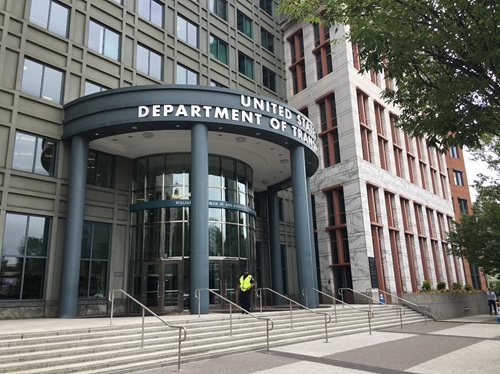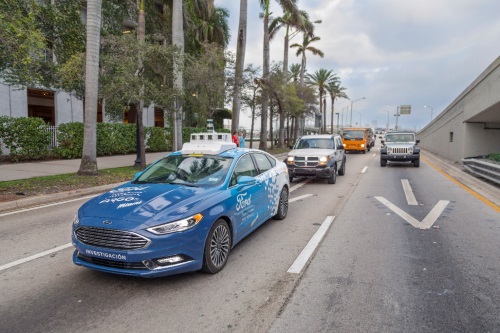The Alliance for Automotive Innovation released what it described as a “comprehensive roadmap” on December 2 to guide the development of federal government policies to advance the testing and deployment of automated vehicles or AVs in the United States.
[Above photo by the Ford Motor Co.]
The 13-page AV Roadmap includes a four-year plan for supportive government policies to enhance the oversight, testing and deployment of AVs and includes 14 specific recommendations addressing the following pillars: reform regulations to allow for AV deployment at scale, harmonize federal, state, and international policies, and laying the foundation to achieve longer term objectives.
The group also released a separate one-page executive summary of its AV Roadmap report.

“Automated vehicles have the potential to solve many of our current transportation dilemmas. They make our roads safer, increase access to mobility, and decrease traffic congestion among other benefits,” noted John Bozzella, the alliance’s president and CEO.
“The United States has long led when it comes to automotive innovation and safety technology, and AVs are the next step in maintaining our technological edge,” he explained. “We look forward to partnering with policymakers at both the federal and state levels to harness the vast potential of AV technology to make transportation safer and more accessible.”
That echoes long-held positions by the American Association of State Highway and Transportation Officials. The group noted, for example, in a 2018 comment letter to the U.S. Department of Transportation that it “welcomed efforts” to map out a concrete set of rules and regulations to govern the deployment of AVs on a national basis, while urging policymakers to view AVs “holistically” as part of an overall transportation system.
Some states are issuing similar “roadmap” reports to help their legislatures develop more cohesive AV rules and regulations.

Maryland Governor Larry Hogan (R) recently highlighted the release of the Maryland Connected and Automated Vehicle (CAV) Strategic Framework as a document designed to “significantly help us achieve our goals to improve roadway safety and increase mobility for countless communities.”
He added in a statement that “Maryland is calling on all state and local agencies, private and academic partners and the public to develop implementation plans that align with CAV technology strategies in this framework.”
That framework concentrates on five “key focus areas” for the future – public education and outreach, planning and policy, early deployment and testing, infrastructure and workforce development – with strategies for state and local agencies, academia, and private industry. Ultimately, the multifaceted approach lays the groundwork for integrating CAV technology safely, efficiently and equitably.

“The release of this framework marks a milestone in Maryland’s efforts to realize the incredible benefits CAV technology can achieve,” explained Chrissy Nizer, administrator of the Maryland Vehicle Administration – a division of the Maryland Department of Transportation – who serves as co-chair of the Maryland CAV Working Group, founded in 2015.
“This sets the stage for how Maryland wants CAVs to be integrated within our communities,” she added.
Meanwhile, the New Jersey Autonomous Vehicle Task Force recently issued a final report to aid in the statewide deployment of driverless vehicles.

“We’ve been working for close to a decade to ensure that the Garden State is a leader in advancing driverless vehicle technology and the many benefits it may provide to New Jerseyans,” explained Tom Kean, a Republican member of the state legislature, in a statement.
“In working towards that goal, it was apparent that we needed a comprehensive plan to allow autonomous vehicles to operate safely and legally on our roads,” he said. “The task force we created has studied the issue in depth and given us thoughtful recommendations to consider and act upon.”
Kean was a prime sponsor of a bipartisan resolution that created the 11-member task force in 2019; a group tasked with assessing AVs and then making recommendations on laws, rules, and regulations that New Jersey may enact or adopt to safely integrate advanced autonomous vehicles on its highways, streets, and roads.
“Driverless vehicles have the potential to revolutionize our transportation industry, provide a new form mobility and increased independence to the disability and senior communities, and make our roads safer for everyone,” Kean said.
“We know autonomous vehicle technology is rapidly advancing, and I’m glad New Jersey lawmakers have shown that we’re able to keep pace,” he added. “If we continue to be proactive, we’ll ensure that New Jersey is a national leader in both the research and the deployment of driverless cars.”
 Top Stories
Top Stories
USDOT Issues $1B in Local Road Safety Funding
January 2, 2026 Top Stories
Top Stories

